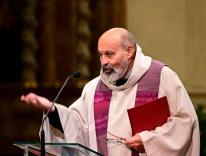Old geezers tend to collect things: coins or stamps, memories or tall tales. Much to my wife’s dismay, I collect vintage copies of Life magazine, dozens of which are piled up in the basement of our home. Let me emphasize that I am a discriminating collector, my interest confined to the period between 1936, when the magazine first appeared, and 1952 (an entirely arbitrary cutoff date). I’m also cheap, so if a dealer is asking more than five bucks a copy, I’ll pass. Niggardliness has a side benefit: our basement is not yet completely overrun.
To spend an evening leafing through old issues of Life is to enter a world radically different from our own. To mistake that world for the “real” world of the 1930s and ’40s would be to commit a grievous error. It is instead Life as interpreted by Henry R. Luce, the magazine’s creator and the self-proclaimed editor-in-chief of the media juggernaut known as Time Inc.
For Luce, interpretation did not imply detachment. By the late 1930s, mere reporting had ceased to describe Time Inc.’s mission. The empire’s purpose was to promote what Luce, in a famous Life essay appearing under his byline in February 1941, christened “The American Century.” In this empathetic but shrewdly insightful biography, Alan Brinkley, Allen Nevins Professor of American History at Columbia, dissects the American Century by charting the ambitions, achievements, and disappointments of its leading celebrant.
Raised in China by Presbyterian missionary parents, educated at Hotchkiss and Yale, Luce entered adulthood fueled by aspirations to be at once great and good. Barely out of college in 1923, he and his classmate Briton Hadden founded Time, the prototypical “newsmagazine.” An instant success, Time was the foundation for what soon became a journalistic behemoth that included Fortune, Life, and various other ventures. By the time Luce reached his early thirties, he was rich and famous and wielded as much power as any other press baron of the age.
He was also deeply unhappy. Having married young, Luce soon tired of his wife and the two sons she bore him. Qualms of conscience only briefly deterred him from abandoning his family in favor of the glamorous Clare Boothe, a divorcée with whom he had fallen passionately in love. As measured by the scope of her ambitions, Clare was Harry’s equal. Yet this second marriage produced only misery for both parties. Passion quickly cooled. In its place came endless quarrels, serial adulteries, and bitter recriminations. At one point Luce even recruited the famous Jesuit John Courtney Murray to serve as marriage counselor, to no avail. Clare and Harry continued to make one another miserable. By comparison, Edward Albee’s George and Martha enjoyed a harmonious union.
His personal life a shambles, essentially friendless, the perpetually restless Luce sought purpose in the pursuit of various and sundry causes. In his mind, those causes necessarily became Time Inc.’s causes. (Balky subordinates did not always share this view.) Although some enthusiasms quickly dissipated—touting the presidential prospects of Wendell Willkie, for example—others persisted. Among the most enduring was China and Luce’s conviction that Americans had a special affinity for and obligation to the country in which he had spent his boyhood. Fulfilling that obligation, he believed, demanded that the United States unstintingly support Chiang Kai-shek, Kuomintang leader and convert to Christianity, in his struggle against the godless communist Mao Zedong. For Luce, China was personal; he was determined to complete the saving work his father had begun.
Yet Luce’s ultimate aim was to spur Americans to fulfill the destiny to which God and history called them. So even as his publications relentlessly celebrated the American way of life with its material abundance, its novelties and diversions, its capacity for reinventing itself and its devotion to homely pieties, Luce refused to allow his fellow citizens to rest on their laurels. He summoned the United States to remake the world in its own image, thereby fulfilling in a single swoop the aspirations of the Founders and the commands of Jesus Christ. “America as the Good Samaritan, really believing again that it is more blessed to give than to receive, and America as the powerhouse of the ideals of Freedom and Justice”—thus did he describe his vision for an American Century.
For others, power might corrupt. Luce implicitly exempted his countrymen from this diktat. For the United States, vast exertions undertaken to remake and redeem the world would make a virtuous people more virtuous still. In Luce’s formulation, the effort promised to raise both Americans themselves and the subjects of their benevolence “from the level of the beasts to what the Psalmist called a little lower than the angels.”
Luce seems not to have been personally or conventionally devout. Yet he was in one sense deeply religious, committed to reconciling secular power with God’s purposes. Luce took it on faith that God’s new Chosen People were uniquely equipped to achieve this reconciliation. “He never stopped thinking,” writes Brinkley, “about how to make the nation live up to the Providential righteousness of America’s destiny (a vision embedded in generations of American Presbyterian history).” After all, had not God created America to serve as his instrument of salvation?
Life (as opposed to Life) offers little to substantiate this contention. Yet even today, many believing Americans persist in the conviction that when the United States acts it is necessarily furthering God’s purposes while simultaneously advancing the cause of human liberty. They discount or simply disregard the considerable evidence suggesting that in their propensity to violate God’s laws, Americans have not differed appreciably from others.
This facile merging of divine purpose with American ambition remains an enduring hallmark of our national character. In that regard the chief proponent of the American Century remains even today the very embodiment of American Christianity.


